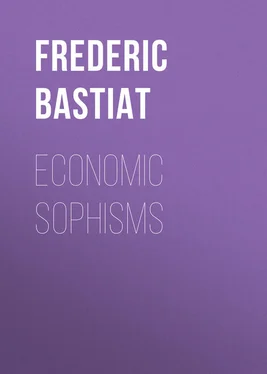Frederic Bastiat - Economic Sophisms
Здесь есть возможность читать онлайн «Frederic Bastiat - Economic Sophisms» — ознакомительный отрывок электронной книги совершенно бесплатно, а после прочтения отрывка купить полную версию. В некоторых случаях можно слушать аудио, скачать через торрент в формате fb2 и присутствует краткое содержание. ISBN: , Жанр: foreign_antique, foreign_prose, на английском языке. Описание произведения, (предисловие) а так же отзывы посетителей доступны на портале библиотеки ЛибКат.
- Название:Economic Sophisms
- Автор:
- Жанр:
- Год:неизвестен
- ISBN:http://www.gutenberg.org/ebooks/44145
- Рейтинг книги:3 / 5. Голосов: 1
-
Избранное:Добавить в избранное
- Отзывы:
-
Ваша оценка:
- 60
- 1
- 2
- 3
- 4
- 5
Economic Sophisms: краткое содержание, описание и аннотация
Предлагаем к чтению аннотацию, описание, краткое содержание или предисловие (зависит от того, что написал сам автор книги «Economic Sophisms»). Если вы не нашли необходимую информацию о книге — напишите в комментариях, мы постараемся отыскать её.
Economic Sophisms — читать онлайн ознакомительный отрывок
Ниже представлен текст книги, разбитый по страницам. Система сохранения места последней прочитанной страницы, позволяет с удобством читать онлайн бесплатно книгу «Economic Sophisms», без необходимости каждый раз заново искать на чём Вы остановились. Поставьте закладку, и сможете в любой момент перейти на страницу, на которой закончили чтение.
Интервал:
Закладка:
And in order that there may be no mistake as to his meaning, the Minister takes care afterwards to explain more fully his ideas; and as he had just before called the intensity of labour wealthy he goes on to call the more abundant results of that labour, or the more abundant supply of things proper to satisfy our wants, poverty . "Everywhere," he says, "machinery has taken the place of manual labour; everywhere production superabounds; everywhere the equilibrium between the faculty of producing, and the means of consuming, is destroyed." We see, then, to what, in M. de Saint-Cricq's estimation, the critical situation of the country was owing – it was to having produced too much, and her labour being too intelligent, and too fruitful. We were too well fed, too well clothed, too well provided with everything; a too rapid production surpassed all our desires. It was necessary, then, to put a stop to the evil, and for that purpose, to force us, by restrictions, to labour more in order to produce less.
I have referred likewise to the opinions of another Minister of Commerce, M. d'Argout. They deserve to be dwelt upon for an instant. Desiring to strike a formidable blow at beet-root culture, he says, "Undoubtedly, the cultivation of beet-root is useful, but this utility is limited . The developments attributed to it are exaggerated. To be convinced of this, it is sufficient to observe that this culture will be necessarily confined within the limits of consumption. Double, triple, if you will, the present consumption of France, you will always find that a very trifling portion of the soil will satisfy the requirements of that consumption ." (This is surely rather a singular subject of complaint!) "Do you desire proof of this? How many hectares had we under beet-root in 1828? 3130, which is equivalent to 1-10, 540th of our arable land. At the present time, when indigenous sugar supplies one-third of our consumption, how much land is devoted to that culture? 16,700 hectares , or 1-1978th of the arable land, or 45 centiares in each commune. Suppose indigenous sugar already supplied our whole consumption, we should have only 48,000 hectares under beet-root, or 1-689th of the arable land." 6 6 It is fair to M. d'Argout to say that he put this language in the mouth of the adversaries of beet-root culture. But he adopts it formally, and sanctions it besides, by the law which it was employed to justify.
There are two things to be remarked upon in this citation – the facts and the doctrine. The facts tend to prove that little land, little capital, and little labour are required to produce a large quantity of sugar, and that each commune of France would be abundantly provided by devoting to beet-root cultivation one hectare of its soil. The doctrine consists in regarding this circumstance as adverse, and in seeing in the very power and fertility of the new industry, a limit to its utility .
I do not mean to constitute myself here the defender of beet-root culture, or a judge of the strange facts advanced by M. d'Argout; 7 7 Supposing that 48,000 or 50,000 hectares were sufficient to supply the present consumption, it would require 150,000 for triple that consumption, which M. d'Argout admits as possible. Moreover, if beet-root entered into a six years' rotation of crops, it would occupy successively 900,000 hectares, or 1-38th of the arable land.
but it is worth while to scrutinize the doctrine of a statesman, to whom France for a long time entrusted the care of her agriculture and of her commerce.
I remarked in the outset that a variable relation exists between an industrial effort and its result; that absolute imperfection consists in an infinite effort without any result; absolute perfection in an unlimited result without any effort; and perfectibility in the progressive diminution of effort compared with the result.
But M. d'Argout tells us there is death where we think we perceive life, and that the importance of any branch of industry is in direct proportion to its powerlessness. What are we to expect, for instance, from the cultivation of beet-root? Do you not see that 48,000 hectares of land, with capital and manual labour in proportion, are sufficient to supply all France with sugar? Then, this is a branch of industry of limited utility; limited, of course, with reference to the amount of labour which it demands, the only way in which, according to the ex-Minister, any branch of industry can be useful. This utility would be still more limited, if, owing to the fertility of the soil, and the richness of the beet-root, we could reap from 24,000 hectares, what at present we only obtain from 48,000. Oh! were only twenty times, a hundred times, more land, capital, and labour necessary to yield us the same result , so much the better. We might build some hopes on this new branch of industry, and it would be worthy of state protection, for it would offer a vast field to our national industry. But to produce much with little! that is a bad example, and it is time for the law to interfere.
But what is true with regard to sugar, cannot be otherwise with regard to bread. If, then, the utility of any branch of industry is to be estimated not by the amount of satisfactions it is fitted to procure us with a determinate amount of labour, but, on the contrary, by the amount of labour which it exacts in order to yield us a determinate amount of satisfactions, what we ought evidently to desire is, that each acre of land should yield less corn, and each grain of com less nourishment; in other words, that our land should be comparatively barren; for then the quantity of land, capital, and manual labour that would be required for the maintenance of our population would be much more considerable; we could then say that the demand for human labour would be in direct proportion to this barrenness. The aspirations of MM. Bugeaud, Saint-Cricq, Dupin, and d'Argout, would then be satisfied; bread would be dear, labour abundant, and France rich – rich at least in the sense in which these gentlemen understand the word.
What we should desire also is, that human intelligence should be enfeebled or extinguished; for, as long as it survives, it will be continually endeavouring to augment the proportion which the end bears to the means, and which the product bears to the labour . It is in that precisely that intelligence consists.
Thus, it appears that sisyphism has been the doctrine of all the men who have been intrusted with our industrial destinies. It would be unfair to reproach them with it. This principle guides Ministers only because it is predominant in the Chambers; and it predominates in the Chambers only because it is sent there by the electoral body, and the electoral body is imbued with it only because public opinion is saturated with it.
I think it right to repeat here that I do not accuse men such as MM. Bugeaud, Dupin, Saint-Cricq, and d'Argout of being absolutely and under all circumstances sisyphists . They are certainly not so in their private transactions; for in these they always desire to obtain by way of exchange what would cost them dearer to procure by direct production ; but I affirm they are sisyphists when they hinder the country from doing the same thing. 8 8 See on the same subject, Sophismes Économiques , second series, ch. xvi., post, and Harmonies Économiques , ch. vi.
IV. TO EQUALIZE THE CONDITIONS OF PRODUCTION
It has been said…but in case I should be accused of putting sophisms into the mouths of the protectionists, I shall allow one of their most vigorous athletes to speak for them.
"It has been thought that protection in our case should simply represent the difference which exists between the cost price of a commodity which we produce and the cost price of the same commodity produced by our neighbours… A protective duty calculated on this basis would only ensure free competition…; free competition exists only when there is equality in the conditions and in the charges. In the case of a horse race, we ascertain the weight which each horse has to carry, and so equalize the conditions; without that there could be no fair competition. In the case of trade, if one of the sellers can bring his commodity to market at less cost, he ceases to be a competitor, and becomes a monopolist… Do away with this protection which represents the difference of cost price, and the foreigner invades our markets and acquires a monopoly." 9 9 M. le Vicomte de Romanet.
Интервал:
Закладка:
Похожие книги на «Economic Sophisms»
Представляем Вашему вниманию похожие книги на «Economic Sophisms» списком для выбора. Мы отобрали схожую по названию и смыслу литературу в надежде предоставить читателям больше вариантов отыскать новые, интересные, ещё непрочитанные произведения.
Обсуждение, отзывы о книге «Economic Sophisms» и просто собственные мнения читателей. Оставьте ваши комментарии, напишите, что Вы думаете о произведении, его смысле или главных героях. Укажите что конкретно понравилось, а что нет, и почему Вы так считаете.












